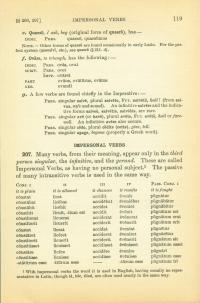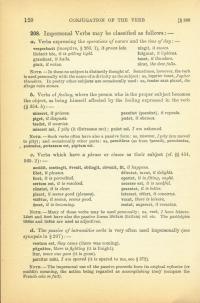207. Many verbs, from their meaning, appear only in the 3rd person singular, the infinitive, and the gerund. These are called Impersonal Verbs, as they have no personal subject.1 The passive of many intransitive verbs is used in the same way.
| 1st Conj. | 2nd Conj. | 3rd Conj. | 4th Conj. | 1st Conj. Pass. |
| it is plain | it is allowed | it chances | it results | it is fought |
| cōnstat | licet | accidit | ēvenit | pūgnātur |
| cōnstābat | licēbat | accidēbat | ēveniēbat | pūgnābātur |
| cōnstābit | licēbit | accidet | ēveniet | pūgnābitur |
| cōnstitit | licuit , -itum est | accidit | ēvēnit | pūgnātum est |
| cōnstiterat | licuerat | acciderat | ēvēnerat | pūgnātum erat |
| cōnstiterit | licuerit | acciderit | ēvēnerit | pūgnātum erit |
| cōnstet | liceat | accidat | ēveniat | pūgnētur |
| cōnstāret | licēret | accideret | ēvenīret | pūgnārētur |
| cōnstiterit | licuerit | acciderit | ēvēnerit | pūgnātum sit |
| cōnstitisset | licuisset | accidisset | ēvēnisset | pūgnātum esset |
| cōnstāre | licēre | accidĕre | ēvenīre | pūgnārī |
| cōnstitisse | licuisse | accidisse | ēvēnisse | pūgnātum esse |
| -stātūrum esse | -itūrum esse |
— |
-tūrum esse | pūgnātum īrī |
208. Impersonal Verbs may be classified as follows.
a. Verbs expressing the operations of nature and the time of day.
|
vesperāscit it grows late |
ningit it snows |
| lūcīscit hōc it is getting light | fulgurat it lightens |
| grandinat it hails | tonat it thunders |
| pluit it rains | rōrat the dew falls |
Note— In these no subject is distinctly thought of. Sometimes, however, the verb is used personally with the name of a divinity as the subject
Iuppiter tonat. Jupiter thunders.
In poetry other subjects are occasionally used
Fundae saxa pluunt. The slings rain stones.
b. Verbs of feeling, where the person who is the proper subject becomes the object, being himself affected by the feeling expressed in the verb (§ 354.b).
| miseret it grieves | paenitet (poenitet) it repents |
| piget it disgusts | pudet it shames |
| taedet it wearies | |
| miseret mē I pity (it distresses me) | pudet mē I am ashamed |
Note— Such verbs often have also a Passive form
misereor I pity (am moved to pity)
and occasionally other parts.
paenitūrus (as from †paeniō)
paenitendus, pudendus
pertaesum est
pigitum est
c. Verbs which have a phrase or clause as their subject (cf. §454, § 569.2).
| accidit, contingit, ēvenit, obtingit, obvenit, fit it happens | |
| libet it pleases | dēlectat, iuvat it delights |
| licet it is permitted | oportet it is fitting, ought |
| certum est it is resolved | necesse est it is needful |
| cōnstat it is clear | praestat it is better |
| placet it seems good (pleases) | interest, rēfert it concerns |
| vidētur it seems, seems good | vacat there is leisure |
| decet it is becoming | restat, superest it remains |
Note— Many of these verbs may be used personally.
Vacō. I have leisure.
Libet and licet also have the passive forms libitum (licitum) est etc. The participles libēns and licēns are used as adjectives.
d. The passive of intransitive verbs is very often used impersonally (see synopsis in § 207 above).
ventum est they came (there was coming)
pūgnātur there is fighting (it is fought)
ītur some one goes (it is gone)
parcitur mihi I am spared (it is spared to me, see § 372)
Note— The impersonal use of the passive proceeds from its original reflexive (or middle) meaning, the action being regarded as accomplishing itself (compare the French cela se fait).


